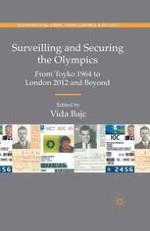2016 | OriginalPaper | Chapter
Promoting “Civility,” Excluding the Poor (Vancouver 2010)
Author : Jacqueline Kennelly
Published in: Surveilling and Securing the Olympics
Publisher: Palgrave Macmillan UK
Activate our intelligent search to find suitable subject content or patents.
Select sections of text to find matching patents with Artificial Intelligence. powered by
Select sections of text to find additional relevant content using AI-assisted search. powered by
The 2010 Vancouver Winter Olympics ushered in “the most complex domestic [surveillance] operation ever undertaken in Canada.”1 Preparations began at least four years prior to ensure the smooth interinstitutional collaboration between the Royal Canadian Mounted Police (Canada’s federal policing arm), municipal police forces, the Canadian Armed Forces, and private security firms, which together became the Vancouver 2010 Integrated Security Unit. These “official” aspects of surveillance for the Vancouver Games were supplemented by legislative changes, the implementation of new bylaws, and city “guidelines” for residents of Vancouver. This chapter traces these initiatives, as represented within media reports, legislature records, and official documentation, and asks: for whom are these practices intended? Through a qualitative research project designed to investigate the experiences of homeless and street-involved youth in the year prior to and during the Vancouver Winter Olympics, the chapter attempts to illuminate the effects of such surveillance regimes on the most marginalized members of host cities. In doing so, I wish to highlight larger issues pertaining to the neoliberalization of city spaces, intensified under the auspices of Olympic preparations, and the implications these have for marginalized residents’ citizenship rights within urban spaces.
